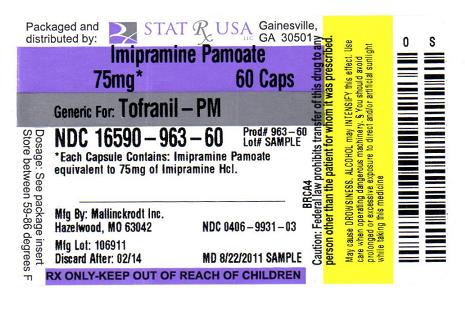Imipramine Pamoate Capsule while Breastfeeding

What is Imipramine Pamoate Capsule used for?
I am breastfeeding mother and I am using Imipramine Pamoate Capsule. Can it have any bad effect on my kid? Shall I search for better alternative?

Nursing Mothers Limited data suggest that imipramine is likely to be excreted in human breast milk. As a general rule, a woman taking a drug should not nurse since the possibility exists that the drug may be excreted in breast milk and be harmful to the child.
Imipramine Pamoate Capsule Breastfeeding Analsys
Imipramine hydrochloride while Breastfeeding
SafeExcreted into breast milk in a clinically non-significant amount with no problems observed in breastfed infants from treated mothers. Levels found in the plasma of those infants were very low or undetectable. Galactorrhea out of the breastfeeding period has been described.
Imipramine Pamoate Capsule Breastfeeding Analsys - 2
Imipramine hydrochloride while Breastfeeding
CAS Number: 50-49-7
Milk levels of imipramine and its metabolite are low and have not been detected in the serum of breastfed infants. Immediate side effects have not been reported and a limited amount of follow-up has found no adverse effects on infant growth and development. Imipramine use during breastfeeding would usually not be expected to cause any adverse effects in breastfed infants, especially if the infant is older than 2 months. Some experts consider imipramine one of the antidepressants of choice for nursing mothers.[1][2] Other agents with may be preferred when large doses are required or while nursing a newborn or preterm infant.
I am nursing mother and I have already used Imipramine Pamoate Capsule, what should I do?
As usage of Imipramine Pamoate Capsule is mostly safe while breastfeeding hence there should not be any concern. In case of any change in behavior or health of your baby you should inform your health care provider about usage of Imipramine Pamoate Capsule else no further action is required.
I am nursing mother and my doctor has suggested me to use Imipramine Pamoate Capsule, is it safe?
Definitely, Imipramine Pamoate Capsule is safe in lactation for baby. No wonder your doctor has recommended it.
If I am using Imipramine Pamoate Capsule, will my baby need extra monitoring?
No extra baby monitoring required while mother is using Imipramine Pamoate Capsule
Who can I talk to if I have questions about usage of Imipramine Pamoate Capsule in breastfeeding?
US
National Womens Health and Breastfeeding Helpline: 800-994-9662 (TDD 888-220-5446) 9 a.m. and 6 p.m. ET, Monday through Friday
UK
National Breastfeeding Helpline: 0300-100-0212 9.30am to 9.30pm, daily
Association of Breastfeeding Mothers: 0300-330-5453
La Leche League: 0345-120-2918
The Breastfeeding Network supporter line in Bengali and Sylheti: 0300-456-2421
National Childbirth Trust (NCT): 0300-330-0700
Australia
National Breastfeeding Helpline: 1800-686-268 24 hours a day, 7 days a week
Canada
Telehealth Ontario for breastfeeding: 1-866-797-0000 24 hours a day, 7 days a week
